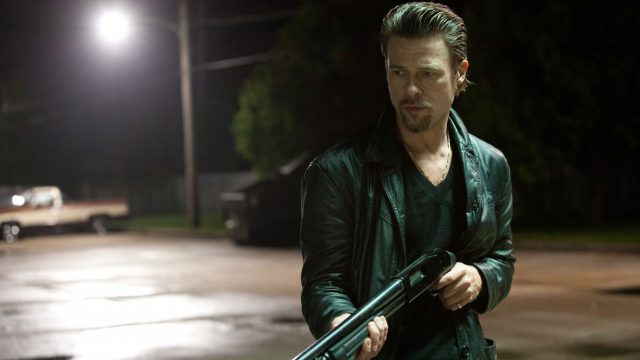Cinemascore purports to know what “real” people “really” think about movies. They find these “real” opinions by conducting surveys in all of America’s most well-populated sewers and most rundown mental asylums and then filtering those results through a secret algorithm that consistently and mysteriously spits out high grades for expensive studio movies and lower grades for independent and art house films. (Cinemascore makes money by selling their research to studios who then use those numbers in their marketing). Mostly what Cinemascore measures is the accuracy of a film’s advertising, something that is amplified by their algorithm that reduces the scores of divisive movies and boosts the scores of mediocrebut uncontroversial films. Still, as useless as they may be as a measure of quality, it’s noteworthy how few movies actually receive an F. For all of Cinemascore’s tampering and sabotage, they’re still providing something akin to an average of what people who paid to see a movie on its opening night thought of it. It’s difficult to generate such extreme negative reactions from such a friendly crowd. Since Cinemascore began operation in 1979, only 19 films have received the lowest score. In this series I’ll be reviewing those 19 films. Up first, 2012’s recession based crime drama, Killing Them Softly.
So What Is It?
Set during the 2008 financial crisis and scored to a series of political speeches, Killing Them Softly is an adaption of George V Higgins’ novel, Coogan’s Trade (a soft sequel to The Friends of Eddie Coyle). Andrew Dominik, best known for directing the art-house favorite but audience-repelling The Assassination of Jesse James by the Coward Robert Ford, moves the action from 1970s Boston to New Orleans in the midst of the 2008 economic crash, but is otherwise fairly faithful to the plot and tone of the novel.
The story is mostly told through a series of conversations. In the first, Vincent Curatola recruits Scoot McNairy and Ben Mendelsohn to rob mobster Ray Liotta’s poker game. Liotta once robbed his own game, and so they figure if it happens again, he’ll take the fall. After the heist, Richard Jenkins, a sort of corporate middleman for the mafia, hires hitman Brad Pitt to settle the situation. Pitt sees through the ruse immediately, but suggests killing Liotta all the same in order to return confidence to the local economy. Jenkins opts for a beating instead, even though Pitt warns him he’s only delaying the inevitable. Ben Mendelsohn can’t keep quiet about the heist, and Jenkins again meets with Pitt, this time okaying all four murders. Pitt knows Curatola and so suggests bringing in James Gandolfini to do that job. Pitt has a few meetings with Gandolfini, but the man has become a lush, so he arranges to have him picked up on a parole violation. Mendelsohn, meanwhile, gets busted on a heroin deal and is put safely behind bars. Pitt recruits McNairy to help kill Curatola, and then murders them both. Finally, he collects his money from Jenkins, delivering some thuddingly heavy-handed thoughts on the movie’s theme in the process. The film is short, but deliberately paced, more of a character study than a thriller. It has a low-key naturalistic style, somewhat undermined by a few out of place seventies touches, and a bleak fatalistic tone.
So Why the F?
At first glance, Killing Them Softly is the most surprising movie on the list. It got solid reviews, and isn’t a particularly inaccessible film. There’s usually about half a dozen of these low-key crime dramas released every year and this one is among the best. But look a little closer and we see two things that are going to be nearly constant in this series; a movie star trying something different and a misleading trailer. People were sold on a Tarantino-esque crime thriller starring Brad Pitt (Inglourious Basterds, Snatch), Ray Liotta (Goodfellas), and James Gandolfini (The Sopranos), and what they got was a quiet rumination on the cruelties of late capitalism from the guy who directed The Assassination of Jesse James by the Coward Robert Ford. The film’s politics, vague but confrontational, probably didn’t help either.
So Were Whey Right?
Killing Them Softly certainly doesn’t deserve an F. It’s an impeccably acted film featuring one of James Gandolfini’s last great performances, arguably Ben Mendelsohn’s breakout role, and steller work from Pitt, Liotta, Scoot McNairy, and the always fantastic Richard Jenkins. It’s beautifully shot, tense, and engaging. It features several impactful and memorable scenes. It has a (mostly) excellent ear for dialogue, striking a nice balance between clever and naturalistic. And although it is meticulously paced, there is plenty of incident for a 97-minute movie. That said, this is still a flawed film. The plot is just a little too straight. Scoot McNairy does something foolish that will probably get him killed, Brad Pitt shows up to kill him, Brad Pitt kills him. There’s no subversion anywhere in the story. It’s one thing to be fatalistic, but we’re never given a reason for that fatalism to feel tragic. And for such a ponderous movie, it doesn’t actually have much to say about capitalism. I think if we had seen the impact the stolen money had on McNairy’s life, everything else would have fallen in place. When we first meet him, he’s complaining that he has no girl and no money, because he can’t get a job, because he has no car. He’s stuck in a spiral of poverty. So let’s see how a few thousand dollars can break that spiral. Lets see him get his life together and fall in love, and then Brad Pitt shows up to kill him, and now we have a tangible sense of what the characters are killing and dying for. The way that the system’s refusal to provide for its people turns them into monsters. And we’re invested in McNairy and want to see him avoid his fate. Without that setup, the action becomes perfunctory and weightless and the themes are unable to escape the conversations they’re expressed in, largely relegated to the background television speeches. Killing Them Softly is not a bad movie In fact, it’s a pretty good movie. But it’s a movie whose ambitions are obvious in a way that draws attention to all its flaws and makes the film feel condescending and shallow. And that’s the sort of attitude that can piss off an audience.

Up Next: William Friedkin, Michael Shannon, and Ashley Judd weird everyone out with a horror movie that gets a bit too creepy.

